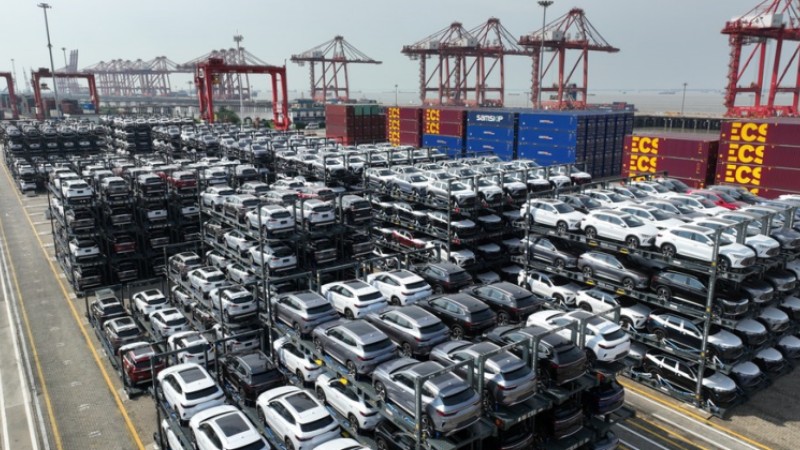"Iron-clad friendship" is the reflection of the great and special bond between our two peoples: Ambassador of Serbia to China

Maja Stefanovic, ambassador of Serbia to China. (Photo provided by the Embassy of Serbia in China)
In 1993, Maja Stefanovic, a Serbian girl, came to Liaoning Normal University to learn Chinese from scratch. The 10 months she spent studying and living in Dalian left her with wonderful memories. From 2012 to 2017, she worked at the Embassy of the Republic of Serbia in China. In 2022, Stefanovic revisited China as the ambassador of Serbia to China. In a recent interview with People’s Daily Overseas Edition, she said, “Being an ambassador to China is the highest honor for me in the 25 years as a diplomat so far, and it is the responsibility of almost every Serbian diplomat to maintain and develop relations with China.”
“Moved by the kindness of ordinary Chinese people”
Last October, Stefanovic received a special letter shortly after she took office in China. It was from a student of food engineering at Jiangnan University, to whom Stefanovic is a stranger. The letter was handwritten in both English and Chinese. It reads, “Serbia is our friend and the two countries enjoy deep friendship. The Chinese people are very hospitable. Welcome to China.” Deeply touched by the kindness of a stranger, she immediately called the student to express her gratitude. Since then she has a new WeChat friend, an ordinary Chinese student. “The student hadn’t known a Serbian in real life, but his letter was full of sincerity for Serbia. Such kind of emotional connection is worth cherishing. I will always treasure that letter as a vivid example of the friendship between the Serbian and Chinese peoples,” Stefanovic said.
There is a saying in Serbia, “Friends are fruits of time.” During her engagement with China in the past three decades, Stefanovic has made a lot of lifelong friends and witnessed the increasingly stronger “iron-clad friendship” between Serbia and China. Stefanovic will not forget that in 1999, the NATO bombed Yugoslavia, causing massive civilian casualties. The NATO also attacked the former Chinese Embassy in Belgrade, which left three journalists working there dead. They stood with the people of Serbia in the most difficult and saddest of times and sacrificed their lives. Today, the Chinese Cultural Center in Belgrade has been built on the site of the bombed Chinese embassy in Yugoslavia, which has become another symbol of the “iron-clad friendship” between Serbia and China, demonstrating to the world the common pursuit of Serbia and China to uphold fairness and justice and promote world peace.
Stefanovic will not forget that in 2020, China was the first country that gave medical aid to Serbia in the difficult times of Serbia’s fight against COVID-19. The Chinese medical team has fought side by side with Serbian medical personnel for 82 days. A lot of Chinese people waited in front of the Serbian Embassy in Beijing in long queues to deliver individual donations. “There were many elderly people and children in the queue, who donated their face masks to support Serbia’s fight against the pandemic. We were moved by the kindness of ordinary Chinese people. ‘Iron-clad friendship’ is not a simple term, but the truest reflection of the great and special bond between our two peoples,” Stefanovic said.

Cityscape of Belgrade, the capital of Serbia. (Photo provided by the Tourism Organisation of Serbia)
“We see opportunities rather than risks in China”
Over the past 30 years, wherever she was, Stefanovic has always paid attention to the development of China, and her life has also followed the trend of Chinese society. “I opened a WeChat account in 2012, and I was probably among the first to use it. I often use Chinese social media, which is an important channel to communicate with Chinese netizens. I also watch movies that attract Chinese audiences. The film ‘My People, My Country’, a seven-part anthology to mark the 70th anniversary of the founding of the People’s Republic of China, is one of the best I’ve ever seen,” Stefanovic added.
Bearing witness to China’s extraordinary journey, Stefanovic has a deeper understanding of Chinese modernization. “The achievements of Chinese modernization is something that has been reached by the efforts and determination of Chinese people under the leadership of the Communist Party of China. I am deeply honored to witness the rapid changes in China,” she said. Stefanovic believes that Chinese modernization inspires the world that a country must take into account its national conditions and has its own characteristics on the way toward modernization. Chinese modernization is deeply rooted in China’s fine traditional culture, with deep historical origin and profound cultural heritage. “China’s history is not just 100 years old. For thousands of years, the Chinese civilization has made great contributions to the world. The Chinese people have every reason to be proud of the fine traditional Chinese culture and the contribution of the Chinese civilization to the world,” Stefanovic said.
Stefanovic holds that China, which is constantly moving towards modernization, will provide more public goods to the world. She highly appreciates China’s view that “common development of all countries is real development”, because “world prosperity and stability cannot be based on the fact that the poor get poorer, and the rich get richer”. She said that the Chinese solutions such as the Belt and Road Initiative fully demonstrated that Chinese modernization will benefit the world as a whole. Each country, according to its own national strategy, potentials and interest, can cooperate with China. “We see opportunities rather than risks in China,” Stefanovic said.

Children participating in the Guča Trumpet Festival. (Photo provided by the Dragačevo tourism organization)
Looking forward to the early completion of the Belgrade-Budapest Railway
In Serbia, the tangible results of mutually beneficial cooperation between China and Serbia can be found everywhere, and the support of the local people for deepening cooperation with China can be felt at all times. Earlier this year, citizens of Smederevo, the “City of Steel” in Serbia, celebrated the Spring Festival with their Chinese friends. In 2016, a Chinese company took over the Smederevo Steel Mill in the most difficult days of the city, keeping the jobs of more than 5,000 people and their livelihood. “Under the Belt and Road Initiative, many Chinese companies have invested in Serbia, benefiting not only the Smederevo Steel Mill, but also Bor Copper, which has been brought back to life by Chinese companies. Investments by Chinese companies have not only helped improve the living standards of people in Smederevo and Bor, but also promoted the overall economic growth of Serbia. In recent years, these Chinese-invested companies have been among the largest exporters in Serbia,” Stefanovic said.
China has brought to Serbia not only investment, but also convenient transportation. The Belgrade-Budapest Railway project is a flagship project within the China-Central and Eastern European countries cooperation platform, connecting Belgrade with Budapest, the capital of Hungary. In March this year, the Belgrade-Novi Sad section of the Belgrade-Budapest Railway celebrated its first anniversary of its opening. The line has cut travel time between the two cities from 90 minutes to about 30 minutes, enabling many people to lead a “twin-city life” between Belgrade and Novi Sad. Stefanovic is eagerly looking forward to the early completion of the Belgrade-Budapest Railway. As an important part of the China-Europe Land-Sea Express Line, the Belgrade-Budapest Railway connects the China-Europe Railway Express to the north, she said. “I hope that the railway will not only benefit Serbia and Hungary, but also help promote interconnected regional development.”
Stefanovic expects more from the prospect of economic and trade cooperation between Serbia and China. She explained that a national pavilion of Serbia has been opened on China’s e-commerce platform and products such as Serbian wine, coffee and dairy products were very popular among Chinese consumers. Recently, Serbian honey product and pet food were approved for export to China. While trying to bring more high-quality Serbian products to the Chinese market, Stefanovic is also thinking about potential to introduce China’s mobile payment systems in Serbia. “Chinese e-commerce platforms are very popular in Serbia, and many young people shop directly from Chinese merchants on them. With direct flights between Serbia and China and an increasing number of Chinese tourists in Serbia, we could consider the advantage of China’s mobile payment systems,” she said.
Photos
Related Stories
- Senior CPC official meets Serbian Progressive Party delegation
- Serbia's president visits construction site of Chinese-built motorway in E. Serbia
- China supports Serbia's effort to safeguard sovereignty, territorial integrity: spokesperson
- Serbia, China mark 24th anniversary of embassy bombing by NATO
- Serbia supports China in safeguarding sovereignty, territorial integrity: parliament speaker
Copyright © 2023 People's Daily Online. All Rights Reserved.









